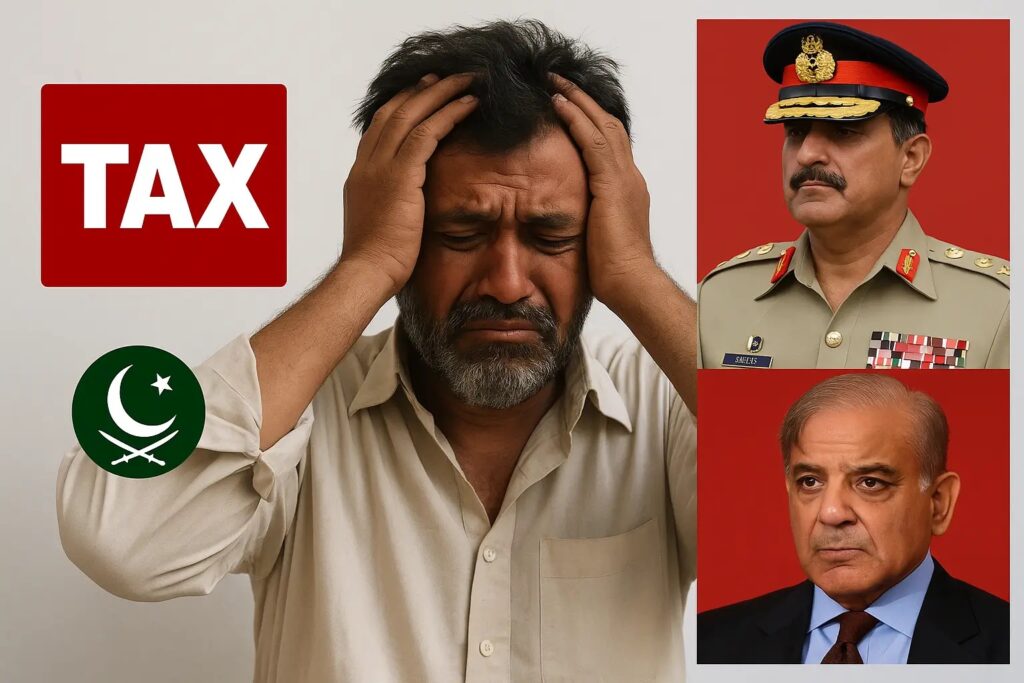The Reality of Tax Hikes in Pakistan’s
In the midst of political instability, economic uncertainty, and global inflation, the people of Pakistan are facing yet another nightmare: record-breaking tax increases. With fuel prices, electricity bills, and everyday commodities already unaffordable for many, the new tax regime feels less like policy and more like punishment.
What makes this situation worse is the glaring incompetence of those in power. Instead of introducing relief measures or economic reforms that benefit the masses, the government has chosen to shift the burden onto the shoulders of those who are already struggling.
Crushing the Middle and Lower Class
No Escape from Inflation
For the average citizen, everything—from a loaf of bread to public transport—has become costlier. The middle class, once seen as the backbone of society, is shrinking. The lower class, already living hand to mouth, is now slipping below the poverty line.
Imagine earning Rs. 25,000 a month and having to spend over Rs. 20,000 on just rent, electricity, and basic groceries. That’s the brutal reality for many Pakistani families today.
Electricity Bills Like a Second Rent
One of the most painful blows has been the hike in electricity tariffs. Monthly power bills in modest households have now crossed Rs. 10,000–15,000, often equal to or more than their rent. These hikes aren’t matched with improved services—load-shedding and power breakdowns continue with no accountability.
Indirect Taxes: The Silent Killer
Instead of progressive taxation that targets the elite, the government has heavily relied on indirect taxes—such as GST on food items, petroleum products, and daily necessities. These taxes hurt the poor more than the rich, yet they are implemented without empathy or foresight.
A Leadership That Doesn’t Listen
The worst part? The people feel abandoned.
This is a government that:
- Fails to control corruption
- Blames global factors without internal reforms
- Prioritizes IMF conditions over citizen welfare
- Appoints ministers without experience or vision
- Holds zero consultation with experts or the public
No Accountability, No Compassion
When questioned, officials either deflect responsibility or label public outrage as politically motivated. But what’s political about a hungry child or a mother choosing between medicine and food?
The disconnect between the rulers and the ruled has never been more obvious.
Rising Unrest and Growing Frustration
Protests, Strikes, and Despair
Across the country, small business owners, laborers, students, and salaried professionals have taken to the streets. From shutter-down strikes to social media campaigns, the public is crying out—but no one in power is responding.
Brain Drain and Lost Hope
Thousands of skilled professionals, especially doctors, engineers, and IT workers, are leaving the country in search of better opportunities. Why? Because they see no future here. They see a nation that punishes talent, effort, and honesty—while rewarding incompetence and corruption.
Is There a Way Out?
What Needs to Change
If Pakistan wants to pull itself out of this economic and social crisis, it must:
1. Revise tax policies to protect the vulnerable.
2. Cut extravagant government spending.
3. Implement wealth taxes on elite assets.
4. Hold corrupt officials accountable.
5.Invest in industries that generate jobs and boost exports.
But all of this requires one thing Pakistan doesn’t seem to have: capable and honest leadership.
Final Thoughts: When Will the Pain End?
The current tax hikes are not just numbers on paper—they are real-life tragedies unfolding in homes across Pakistan. Children are dropping out of school, the elderly are skipping medicine, and families are going hungry. And the people entrusted to serve are doing nothing but sitting in air-conditioned offices, signing deals that serve their interests.
If this trend continues, poverty will rise, frustration will explode, and hope will vanish.
It’s not just a financial crisis—it’s a moral failure.

